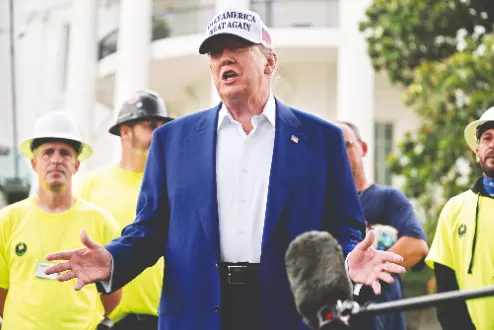Pardon applications being carefully crafted with one man in mind: Donald Trump

Ashland: Pounding away on a prison typewriter, Chad Scott seemed worlds apart from President Donald Trump.
But when the disgraced narcotics agent wrote the White House seeking clemency for his corruption conviction, Scott sought to draw Trump’s attention to what they have in common.
Both men had survived a bullet wound to the ear, Scott wrote, and had been convicted of falsifying records. They were also each a victim of “political persecution,” the type of catchphrase the former agent hoped would resonate with a man who has long complained of witch hunts.
By helping him, Scott argued, Trump would be showing he had “the back of law enforcement.”
“Chad Scott is a hero in this country’s war on drugs,” his attorney wrote in a clemency petition reviewed by The Associated Press, adding it would be a “gross waste of taxpayer money” to house and feed the former US Drug Enforcement Administration agent for six more years.
Scott’s application is hardly unique, according to prisoners, defense attorneys and officials. The White House and the Justice Department have received a wave of such requests — all carefully crafted to capture the attention and fancy of Trump or those who know his inclinations.
The flurry, legal experts said, has been sparked by Trump’s frequent and eyebrow-raising grants of clemency since retaking office in January.
The Republican president has pardoned and commuted the sentences of more than 1,600 people, including many political allies, former GOP officeholders and hundreds charged or convicted in the 2021 Capitol riot.
He even pardoned a pair of reality TV stars who were serving time for bank fraud and tax evasion.
In doing so, Trump has largely cast aside a process that historically has been overseen by nonpolitical personnel at the Justice
Department who spent their days poring over clemency applications — thick packets filled with character references attesting to applicants’ atonement and good deeds.
Only those meeting strict criteria were then passed along to the White House.
Those procedures appear to have been replaced by the caprice of a president known for his transactional approach to governance, his loyalty to supporters and his disdain for perceived enemies.
It’s created “a free-for-all” for those seeking clemency, said Liz Oyer, the Justice Department’s former pardon attorney, who was fired in March.
“The traditional process and practices,” she told the AP, “all seem to have fallen by the wayside.”
That has left an opening for prisoners like Eric Sanchez Chaparro, who is seeking a commutation for a drug and weapons conviction that carries a 19-year prison sentence. The optimism, he said, has never been higher for those behind bars.
“In many ways I feel like he has the same point of view that we’ve got,” Chaparro said in a telephone interview, noting that both he and the president were
convicted of felonies.



